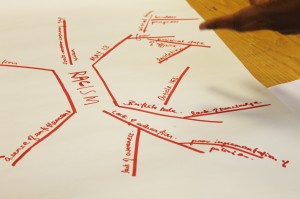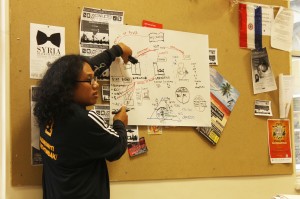This post was reproduced from UKEC’s CEKU written by Aira Nur Ariana Azhari who participated in #IdolaDemokrasi at Manchester and can be found here posted on on 15 July 2012. Thank you Aira!
Partisanship. As with a lot of other words in the English dictionary, we tend to throw the word around, use it liberally, without knowing what it truly means. Plenty of us also attach our own meaning to it, defining the word according to whatever has influenced our own political beliefs.

I myself had my own perceptions of what the word meant. I remember my first exposure to the concept; it was during Barack Obama’s 2008 presidential campaign, where he strongly advocated against ‘petty partisanship’ that poisoned Washington politics.
In all honesty, I don’t believe that there is such a thing as true non-partisanship. I have seen more than enough people who claim to be non-partisan, yet hold opinions so strongly similar to certain political parties that it is difficult to envision them being neutral about anything.
It wasn’t until UndiMsia! came to Manchester in April that I changed my mind. Having heard of the movement before, I assumed all they did was advocate the importance of voting to youths. Little did I know that it was in that session I saw what being non-partisan really was about.
Facilitated by Edmund Bon and Hasbee Abu Bakar, the session was conducted as a workshop, with full participation from the students. UndiMsia! appealed to me immediately when Hasbee declared that this was a ‘safe space’ where we were allowed to express our opinions openly without fear of retribution from anyone. This proved useful as we were then asked to take sides on various issues ranging from homosexual rights to public demonstrations. Some were for, some were against, and some chose to remain neutral. No exchange of insults took place. In fact, I have never seen people be so open about their views regarding such controversial and delicate matters. I liked where this was going.
It was the last module of the session that was the real eye-opener. Edmund warned that this might be a depressing one, and I half-expected to hear that they were going to point out how the UMNO/BN government was ruining the country, and that if we knew any better, it was obvious who to vote for in the upcoming elections.
 Instead, Hasbee brought us all home with his simple, yet effective drawing that showed the current state of affairs in our nation. He first listed out the institutions of government, the mechanisms of our electoral system, and the reality started to sink in. I sat there, lost in my thoughts, as the room went strangely silent.
Instead, Hasbee brought us all home with his simple, yet effective drawing that showed the current state of affairs in our nation. He first listed out the institutions of government, the mechanisms of our electoral system, and the reality started to sink in. I sat there, lost in my thoughts, as the room went strangely silent.
You could tell that this was what the whole session was building up to. Edmund and Hasbee showed us that the real problem faced by us Malaysians was not that we were ruled by the wrong party – it was the existing system that failed us. Through simple diagrams and explanations, we discovered that our current electoral system, where we are allowed one vote every five years, did not truly represent the will of the people.
The system merely perpetuates the electing of the minority elite into power – which then gives them an enormous, often unchecked, amount of power over the not-as-fortunate majority. Most importantly, they made us realise that no matter who controls the federal government – BN or Pakatan Rakyat – the system will remain the same. It is those who rule that stand to gain – and those under their power who lose.
With the dawning of this disturbing reality, Edmund pointed out something else. Not once, since the beginning of the session, did any of us mention political parties whilst analysing the nation’s problems. It was always about the people – whatever credit was due, whatever flaw that was pointed out, it was never ‘this is BN’s fault’, or ‘as if Pakatan can do better’. It was as if the session broadened our horizons and made us look beyond all that. It is us who holds the reins to our destinies. Yes, we need politicians to govern the country, but it is far more important for the people to realise how much power they possess.
It was wonderful to participate in a nation-building activity that stripped away the often superficial elements of parties, personalities and promises. Nation building stripped bare emphasises the inherent awareness of the people regarding the state they are in – and the willingness to do something to change it. Some might label UndiMsia! as being ‘radical’ or ‘liberal’, but I suppose it’s easier to point fingers and hide behind what politicians say, instead of having your own ideals for the nation.
For now, my scepticism on non-partisanship has been put to rest a little. I still believe that in our hearts of hearts, we cannot help but be swayed by the political noise that constantly (and often forcefully) feeds our surroundings day by day. But let that not cloud our judgement and silence our conscience – remember that our problems have roots deeper than ‘which politician can come up with the more self-righteous statement’. After all, if all else fails, we only have ourselves, our own strengths, to rely upon.
I suppose now would be the appropriate moment to insert one of those overused quotes by John F. Kennedy, Mahatma Gandhi or Abraham Lincoln. But do not be quick to sneer at those men’s words, for they are true. We have too much power in our hands – to bicker about which is the better political party would be a dreadful waste. There’s too much at stake, so let’s empower ourselves and ditch the party, people!
Aira is thankful she completed her first year of Law School, and is spending the summer interning at a women’s rights NGO. She secretly longs to live during Regency England, where gentlemen existed and instead of texting, people wrote letters to each other.
The photographs for this article were provided by LoyarBurokker Low Wen Zhen.
